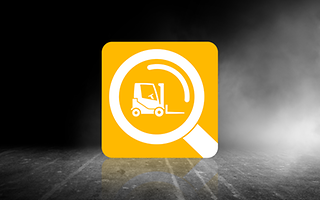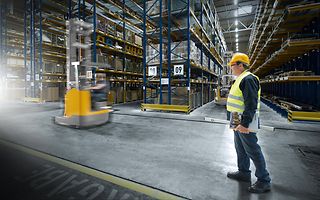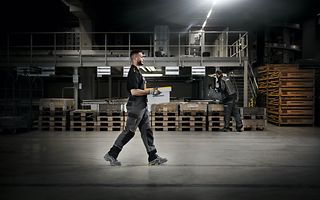- Value of incoming orders Q1–Q3: €3.58 billion / +31 per cent
- Revenue Q1–Q3: €3.02 billion / +11 per cent
- EBIT Q1–Q3: €258.4 million / +72 per cent; EBIT ROS: 8.6 per cent
- Net credit as at 30 September: €295 million
- Forecast for incoming orders and earnings in 2021 raised
- Update on Strategy 2025+: good progress and new targets
- Acquisition of technology company arculus GmbH
Jungheinrich sees positive results in the first three quarters of the 2021 financial year. Even amidst the challenging environment of strained global supply chains, the Group was able to increase its financial key figures, in some cases significantly, compared to the previous year. Incoming orders after nine months exceeded the previous year’s figure by 31 per cent at €3.58 billion. Group revenue increased to €3.02 billion. In a market environment that continues to be challenging, EBIT improved significantly by 72 per cent to €258.4 million. EBIT return on sales increased to 8.6 per cent. Net credit amounted to €295 million as of 30 September 2021. Orders on hand at Jungheinrich AG came to €1.43 billion as at the balance sheet date and were thus 71 per cent higher than in the previous year. As a result of this positive development, Jungheinrich raised its forecast for incoming orders and earnings for the entire 2021 year in October.
Dr Lars Brzoska, Chairman of the Board of Management of Jungheinrich AG: “Despite global supply bottlenecks and much higher material costs, Jungheinrich saw very good business development in the first nine months of the current year. We have largely managed to avoid production standstills through targeted, timely management of our supply chains. This is a major accomplishment, and I would like to thank all the employees, partners and suppliers for making it possible. We will continue to fully implement measures to ensure Jungheinrich’s ability to deliver. The good result and solid orders on hand give us a tailwind for further business development and the continued implementation of our Strategy 2025+.”
Update Strategy 2025+
As part of its quarterly reporting, Jungheinrich is providing the first update on the ongoing implementation of its Strategy 2025+. In light of the current market and business development, the company reviewed and adjusted the strategy’s targets based on the updated expectations for the next few years, as previously announced. The new forecast now expects Group revenue to grow organically to €5.5 billion (previously: €4.6 billion ), the target EBIT return on sales to be in a range of 8 per cent to 10 per cent (previously: >8 per cent) and the new key performance indicator ROCE to be reach a value between 21 per cent and 25 per cent. EBIT per employee is expected to be around €23,000.
A number of Strategy 2025+ projects and measures were initiated around the world in the current year, and some have already been fully implemented.
Automation is key to the future growth of Jungheinrich. In light of this, the Group acquired arculus GmbH, a technology company based in Munich that operates in the autonomous mobile robots (AMR) sector, in the fourth quarter of 2021. arculus focusses on autonomous mobile robots, modular production platforms and software solutions for mobile automation with its experienced team of hardware and software specialists at its sites in Munich, Ingolstadt, Stuttgart and Dresden. Many well-known automotive manufacturers and industrial clients from various other sectors are among arculus clients. In acquiring arculus, Jungheinrich has added highly innovative hardware and software solutions in the rapidly growing autonomous mobile robots sector to its existing portfolio of automation systems. With arculus’s software management system recognised at IFOY Award 2021, AMR and AGV fleets from any manufacturer can be operated with the VDA 5050 interface. Dr Brzoska explains the advantages: “With the acquisition of arculus, we have been able to comprehensively expand our expertise in the automation field of action. Important areas of application – like good-to-person order picking – will see continued strong growth, not least because of the ever-increasing amount of e-commerce. With the team from arculus, we can achieve strong growth synergy and unlock important future fields of action in automated warehouse logistics. Together we are opening a new chapter in the history of the warehouse of the future.”
With the “New IT Plant” project, Jungheinrich has created a hybrid cloud foundation within the digitalisation field of action that further interconnects people, machines and software around the world to make new value-adding business models possible. At the same time, digital fleet management system “Jungheinrich FMS” was further extended in 2021. The central, digital management of fleets, including the access management, detailed evaluation of operating hours and costs, and detailed recording of shocks give operators significant advantages in resource scheduling, maintenance and the availability of trucks. New modules give customers additional advances in productivity and offer a high level of user-friendliness and proactive management of critical situations.
Electric mobility is Jungheinrich’s core skill. As part of Strategy 2025+, the Group is expanding its leading position in energy systems. The new generation of trucks with an integrated lithium-ion battery is an essential part of the strategic orientation in this area. In 2021, Jungheinrich brought two more new trucks with this battery concept to market. Both electric pallet trucks are significantly shorter than previous models thanks to this intelligent integration of the battery. This gives it a special agility and manoeuvrability while driving and allows for precision even in the narrowest spaces. It also creates additional valuable storage space. Alongside this industry leading compact size, they are both the most comfortable and safest trucks of their classes.
Activities in the DEEP programme, which aims to further the digital transformation and increase Group efficiency, in 2021 have included completing the as-is-analysis, including defining the IT target architecture. To further increase customer centricity, implementation projects have been started, particularly the development of a new ERP system.
Proximity to customers through having a local presence in an international network is one of the central factors for the success of the Jungheinrich business model. The strategic goal of Strategy 2025+ is to further expand the Group’s global footprint and achieve a 20 per cent share of revenue outside of the core European market. This is why Jungheinrich intends to increase its growth mainly in North America, but also in Asia.
The core goal of Strategy 2025+ is to create sustainable value for all Jungheinrich stakeholders. Jungheinrich is aware of its economic, environmental and social responsibility for the Group’s activities around the world. Sustainability significantly determines the company’s direction now and in the future and forms the foundation for cooperation at Jungheinrich and its impact. Goals and standards for this sustainable action throughout the whole company were developed as part of Strategy 2025+. Since the first quarter of 2021, all Jungheinrich sites in Germany have been operating exclusively with green electricity; international branches and plants will gradually make the transition. In addition, the Group has begun to generate its own solar power at some of its sites, and all eligible properties will be equipped with photovoltaic facilities step by step. At the same time, the Group-wide company car fleet is also being converted to electric vehicles. Models are also being developed within the company at the moment to anchor sustainability principles in the product development process as well. This includes intensifying our work with suppliers and adjusting as necessary. Standards have been developed for working with suppliers, compliance with which will be regularly audited. The ambitions and measures to protect the climate and resources are proof that Jungheinrich takes its responsibility seriously. With our sustainable product portfolio, we want to be our customers’ first choice.
ADDITIONAL INFORMATION
Development January to September 2021
Market development
The global market volume for material handling equipment grew significantly between January and September 2021 against the same period of the previous year. There was a sharp increase in demand in all regions. Orders in Europe rose noticeably in the reporting period, primarily driven by demand for warehousing equipment.
Incoming orders
Incoming orders, based on units, which includes orders for both new forklifts and trucks for short-term rental, totalled 119.4 thousand trucks, up 48 per cent on the corresponding figure in the same period of the previous year (80.7 thousand trucks). At €3,581 million, the value of incoming orders, which covers all business fields – new truck business1, short-term rental and used equipment as well as after sales – also clearly exceeded the previous year’s figure of €2,732 million (up 31 per cent) reflecting the positive market development, especially in Europe. Orders on hand for new truck business rose to €1,428 million as of 30 September 2021, which is €595 million or 71 per cent higher than the previous-year figure (€833 million).
Revenue
Group revenue in the first months came to €3,020 million and was thus around 11 per cent higher than in the previous year (€2,723 million). The main driver of the increase in Group revenue was the new truck business with revenue growth of €204 million. The primary reasons are the higher demand and a corresponding significant increase in production volume of new trucks as well as solid growth in project orders for automated systems. After sales grew noticeably with revenue amounting to €867 million in the reporting period (previous year: €796 million). Revenue in the financial service business was on a par with the previous year in the first nine months of the reporting year at €827 million (€826 million).
Earnings and financial position
At €258.4 million, Jungheinrich Group’s earnings before interest and income taxes (EBIT) for the period January to September 2021 recorded 72 per cent growth against the same period of the previous year (€150.2 million). This was largely due to the significant increase in capacity utilisation. Jungheinrich was also able to more than compensate for partially significant increases in the price of materials with price adjustments and efficiency measures. Earnings before taxes (EBT) increased significantly to €249.6 million at the end of the first nine months (previous year: €133.8 million). Profit or loss in the period from January to September 2021 stood at €183.5 million (previous year: €96.3 million). Earnings per preferred share were €1.80 (previous year: €0.96). As of 30 September 2021, net credit stood at €295 million (31 December 2020: €194 million). The improvement of €101 million is largely the result of an increased profit or loss plus depreciation, amortisation and impairment losses with moderate growth in working capital.
Forecast
In an ad hoc announcement on 25 October, Jungheinrich raised its forecast for incoming orders, EBIT, EBIT ROS, EBT, EBT ROS and ROCE for 2021 once more. The Board of Management now expects incoming orders of between €4.6 billion and €4.8 billion for the entire 2021 year (previously: €4.2 billion to €4.5 billion). Due to continuing significant challenges in the supply chain, Group revenue is expected to fall within the previously forecast range of €4.0 billion and €4.2 billion. According to current estimates, EBIT in 2021 will come to between € 340 million and € 370 million (previously: €300 million to €350 million). Accordingly, EBIT return on sales is expected to range between 8.5 per cent and 8.8 per cent (previously: 7.5 per cent to 8.3 per cent). EBT is expected to reach €325 million to €355 million (previously: €280 million to €330 million). EBT return on sales should come to between 8.1 per cent and 8.5 per cent (previously: 7.0 per cent to 7.9 per cent). The Board of Management assumes a ROCE value of between 20 per cent and 23 per cent (previously: between 17 per cent and 21 per cent). The ROCE new key performance indicator introduced with effect from 30 June 2021 is expected to reach a value between 19 per cent and 22 per cent (previously: between 17 per cent and 21 per cent).
It is also expected that Jungheinrich will continue to have net credit of well over €300 million at the end of the 2021 financial year.
This increased forecast assumes that the material supply, which continues to be fraught, particularly in the case of electronic components, will not deteriorate significantly during the remaining weeks of the financial year. Measures to safeguard Jungheinrich’s ability to deliver will be continued without change. Nevertheless, there is no guarantee that bottlenecks in the material supply chain will not lead to serious production standstills in the future.
Jungheinrich Group at a glance
| Q3 2021 | Q3 2020 | Change % | Q1-Q3 2021 | Q1-Q3 2020 | Change % |
Incoming orders
(units) | 38,100 | 26,800 | 42.2 | 119,400 | 80,700 | 48.0 |
Incoming orders
(€ million) | 1,162 | 921 | 26.2 | 3,581 | 2,732 | 31.1 |
Revenue (€ million) | 1,032 | 922 | 11.9 | 3,020 | 2,723 | 10.9 |
EBIT (€ million) | 89.1 | 55.0 | 62.0 | 258.4 | 150.2 | 72.0 |
EBIT ROS
(%)1 | 8.6 | 6.0 | -- | 8.6 | 5.5 | -- |
EBT
(€ million) | 84.9 | 52.0 | 63.3 | 249.6 | 133.8 | 86.5 |
EBT ROS
(%)2 | 8.2 | 5.6 | -- | 8.3 | 4.9 | -- |
Profit or loss (€ million) | 62.5 | 36.6 | 70.8 | 183.5 | 96.3 | 90.6 |
Employees
(FTE3, 30 Sep/31 Dec) | | 18,681 | 18,019 | 3.7 |
1 EBIT/revenue x 100
2 EBT/revenue x 100
3 FTE = full-time equivalents





